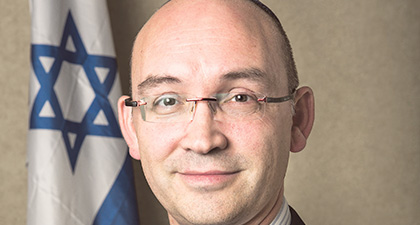Media outlets in Canada and abroad have been focusing on the suffering and death in Gaza and not enough on Hamas, Israel’s consul general to Toronto and Western Canada said at a conference call briefing for Toronto community leaders today.
“We all have to acknowledge there’s a dearth of information among [foreign] editors and producers in the media,” DJ Schneeweiss said. “They don’t know or understand what the barrage of rockets is like, the ongoing threat of the tunnels or the reality or what Israeli life is. When they don’t understand that, of course our response [in Gaza] becomes less intelligible.”
The human suffering, he said, is a function of Hamas. “Hamas is the story here. Israel’s deployment of the Iron Dome and of soldiers in Gaza is a function of Hamas. Hamas is the essence and the explanation.”
When asked about the four innocent Palestinian teenagers killed on a beach by Israeli shelling July 16, Schneeweiss said foreign media have generally not showed the positive things Israel has done, like prosecuting the Israelis who confessed to kidnapping and burning a Palestinian teenager alive.
Schneeweiss said Israel appreciates all the expressions of solidarity with Israel and condemnations of Hamas, as have been occurring in Canadian and other Jewish communities worldwide.
He encouraged people in the Toronto Jewish community to continue publicizing their support of Israel by tuning into Israeli media, sharing relevant stories with their networks on social media and continuing with scheduled summer programs and organized trips to Israel.
“From our point of view, as long as people are staying updated and maintaining – or even enhancing – their connection with Israel, those are things we’d be looking for [in terms of the Jewish community’s support].”
He said that as it proceeds with Operation Protective Edge, Israel’s demands remain simple and focused. Though, “the story remains fraught and is not over yet,” his overall message at the briefing was that the current situation in Israel was straightforward and relatively optimistic.
He emphasized that Israel’s objectives upon deploying a ground offensive in Gaza on July 17 are the same to this day: to disarm Hamas, demilitarize Gaza and “restore calm to our communities.”
Schneeweiss said the network of tunnels dug by Hamas that the Israel Defence Forces (IDF) has discovered is “larger than we anticipated,” with about 66 tunnel entrances and over 20 major tunnels identified to date.
He said 29 Israeli soldiers had been killed since the troops entered Gaza, with “quite a few of those” deaths happening inside Israeli territory while soldiers were trying to guard the tunnels.
He also said that, contrary to what may have been reported by Gazan authorities or the UN, the IDF has killed close to 200 combatants, meaning, he said, “30 per cent or more of the dead in Gaza are combatants [not civilians].”
Another major issue Schneeweiss addressed was that of the Federal Aviation Administration (FAA)’s prohibiting U.S. airline carriers to fly to or from Tel-Aviv’s Ben-Gurion airport on July 22, and Air Canada’s subsequent cancellation of a flight from Toronto to Tel-Aviv.
“We’re confident we’ll see the resumption of Air Canada flights,” Schneeweiss said, adding that the Israeli Air Force had assessed the risk of a rocket hitting an airplane taking off or landing at Ben-Gurion and determined the chance of this happening is one in a million, and a one in 100 billion chance that a plane flying through Israeli air space will get hit by a rocket.
Regarding the prospect of a ceasefire agreement, Schneeweiss reiterated that Israel “hasn’t escalated our demands or changed them” since beginning its ground operation, and that Israel’s goal is “an end to the Hamas assault on citizens and an ongoing end to these rocket assaults.”
“We’re hitting Hamas harder, dismantling its infrastructure and trying to make it so Hamas is denied the ability to undermine our civilians and undermine [present and future] peace efforts.”
He acknowledged the intense international pressure put on both sides to broker a ceasefire agreement and said Israel views Egypt, which “understands the threat Hamas poses,” as central to the process, while players like Qatar and Turkey are “not relevant for us…they’re not able to curtail Hamas attacks.”
He said a humanitarian truce, as has been proposed by UN Secretary-General Ban Ki-moon, “with no political conditions” was a notion rejected by Israel because “we have a job to do and we’re in the middle of it” and that it would allow Hamas to re-group without being bound by conditions.
